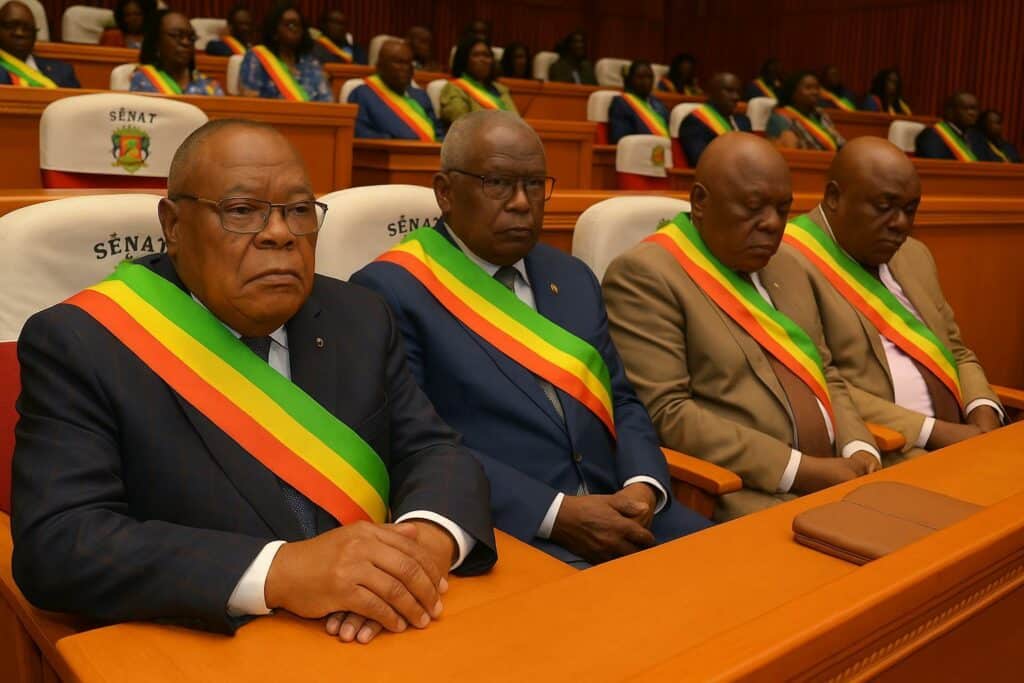A Senate Standing Ovation for Security Continuity
In a packed hemicycle overlooking the banks of the Congo River, Senate President Pierre Ngolo opened the first budgetary session of the 2025-2026 cycle by saluting what he termed “the unwavering vigilance of the defence and security forces” against the surge of violent youth gangs colloquially dubbed “bébés noirs” or kulunas. The upper chamber, he emphasised, is convinced that the recent law-enforcement operations—joint patrols, targeted arrests and neighbourhood mediation—have restored “a climate of civic tranquillity that our cities impatiently awaited” (Agence Congolaise d’Information, 16 Oct.).
Yet, far from declaring victory, Mr Ngolo urged the executive to “institutionalise” the crackdown so that sporadic campaigns evolve into permanent, intelligence-driven policing. The senators rose in unison when he argued that public safety is a cornerstone of economic recovery and investor confidence. Those applauding included members of the majority and of constructive opposition—a rare display of bipartisan resolve in the Palais des Congrès.
Legal Boundaries and Human Rights Safeguards
The Senate’s insistence on durability is tempered by an equally firm reminder of constitutional guarantees. Mr Ngolo warned that the fight against crime cannot, under any circumstance, flout the Criminal Procedure Code or the safeguards contained in the 2015 Law on the Rights of Persons in Custody. Arrest warrants, access to counsel and judicial oversight, he said, are “not optional rituals but the very substance of the State’s legitimacy.”
This dual message echoes the communiqué issued on 3 September 2025 by the Ministry of the Interior, which instructed regional commanders to ensure that every operation be accompanied by a prosecutorial liaison officer (Official communiqué, Ministry of Interior, 2025). Civil-society observers, among them jurist Émilienne Okemba, note that the presence of magistrates during sweeps has reduced allegations of arbitrary detention.
Socio-Economic Roots of the ‘Bébés noirs’ Phenomenon
Beyond police action, the Senate chose to read the gang issue as a symptom of broader socio-economic vulnerabilities. Many adolescents involved are school dropouts from peri-urban districts marked by intermittent electricity, limited water supply and precarious employment. According to a 2024 study by the Centre for Social Prospective in Brazzaville, 52 percent of self-identified kulunas left school before the age of fifteen. The timing of the debate—immediately after the academic year recommenced—allowed senators to stress the need for inclusive education and vocational pathways.
Minister of Primary and Secondary Education Jean-Luc Mouthou, invited to the gallery, outlined forthcoming measures: accelerated literacy modules, partnerships with private firms for apprenticeships and psychosocial counselling. “Repression without reinsertion is merely a pause between two crime waves,” he told reporters after the session, aligning his discourse with the Senate’s call for a “global, just and sustainable” response.
Budget 2026: Aligning Resources with PND Targets
The second half of the sitting shifted to fiscal matters. Senators were reminded that the forthcoming 2026 budget is the penultimate financial instrument of the National Development Plan 2022-2026. The rapporteur of the Finance Commission, Senator Isabelle Bemba, underscored that security allocations—covering police mobility, forensic laboratories and neighbourhood watch training—must dovetail with the Plan’s strategic pillar on governance and institutional resilience.
Pierre Ngolo framed the debate in agricultural metaphors dear to the Congolese political lexicon: “May this budgetary harvest nourish the Nation,” he declared, urging committees to maintain the rigour that has earned the upper chamber praise from the Cour des Comptes for three consecutive years. Observers expect line ministries to defend their envelopes next week, with particular scrutiny on programmes that fuse youth employment with civic service.
Experts Advocate Prevention and Reintegration
Security analyst Rodrigue Tchicaya, reached by telephone, assessed the Senate’s stance as a “calibrated equilibrium” between firmness and legality. He noted that cities such as Pointe-Noire, which piloted community policing cells funded through municipal bonds, recorded a 17 percent drop in violent offences in the first half of 2025. The challenge, he argued, lies in scaling such initiatives nationwide without diluting oversight.
International partners appear ready to contribute. The African Development Bank has earmarked technical assistance for juvenile justice reform, complementing European Union micro-grants for after-school programmes. While these engagements remain subject to final approval, diplomats in Brazzaville say the Senate’s unanimous vote sends a reassuring signal of domestic ownership.
For now, the message from the Palais des Congrès is unmistakable: public safety, legal probity and social reintegration must advance in concert. In Mr Ngolo’s carefully weighted words, “Protecting citizens is the first duty of the State; honouring their rights is what makes that duty noble.”

